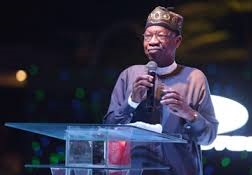 |
| Minister of Inormation, Alhaji Lai Mohammed |
The President Muhammadu Buhari led APC Federal Government has disclosed that Nigeria’s economy witnessed remarkable changes in 2017, including exiting the worst recession in decades and gradual stabilisation of the naira.
Assessing his performance, the President said despite global economic challenges and initial outlook of slow, or unlikely recovery, his administration recorded some key achievements.
He said: “In our review of the economy based on facts and figures from the National Bureau of Statistics, we are pleased to note that the economy has been on the path of steady growth since the second quarter, after contracting for five consecutive quarters.”
According to details released by Special Adviser on Media and Publicity, Femi Adesina, yesterday, the President said his administration is hopeful that the trend would continue to impact on the livelihood of Nigerians.
He added that multilateral institutions like the World Bank and the International Monetary Fund have projected higher growth for the economy in 2018. He said: “The agricultural sector posted consistent growth levels throughout the recession, leading other sectors into positive growth rates. Accordingly, Nigeria saw bumper food harvests, especially in rice, which local production continues to rise significantly with states like Ebonyi, Kebbi and Kano leading the pack, while Ogun joined by the end of 2017.
“The price of a 50kg bag of rice, a staple in our country, has fallen by about 30 per cent since the beginning of 2017, as local production continues to rise. The price will keep falling, as production remains consistent.“The Food and Agriculture Organisation (FAO) said the number of Nigerians facing food insecurity in the North East dropped by half this year.
Against all odds, 2017 has turned out the Year of Nigeria’s Agriculture Revolution, embodied by the successes of the Presidential Fertiliser Initiative (PFI) and the Anchor Borrowers Programme, which were launched by President Buhari.”
In this article:
Assessing his performance, the President said despite global economic challenges and initial outlook of slow, or unlikely recovery, his administration recorded some key achievements.
He said: “In our review of the economy based on facts and figures from the National Bureau of Statistics, we are pleased to note that the economy has been on the path of steady growth since the second quarter, after contracting for five consecutive quarters.”
According to details released by Special Adviser on Media and Publicity, Femi Adesina, yesterday, the President said his administration is hopeful that the trend would continue to impact on the livelihood of Nigerians.
He added that multilateral institutions like the World Bank and the International Monetary Fund have projected higher growth for the economy in 2018. He said: “The agricultural sector posted consistent growth levels throughout the recession, leading other sectors into positive growth rates. Accordingly, Nigeria saw bumper food harvests, especially in rice, which local production continues to rise significantly with states like Ebonyi, Kebbi and Kano leading the pack, while Ogun joined by the end of 2017.
“The price of a 50kg bag of rice, a staple in our country, has fallen by about 30 per cent since the beginning of 2017, as local production continues to rise. The price will keep falling, as production remains consistent.“The Food and Agriculture Organisation (FAO) said the number of Nigerians facing food insecurity in the North East dropped by half this year.
Against all odds, 2017 has turned out the Year of Nigeria’s Agriculture Revolution, embodied by the successes of the Presidential Fertiliser Initiative (PFI) and the Anchor Borrowers Programme, which were launched by President Buhari.”
In this article:
